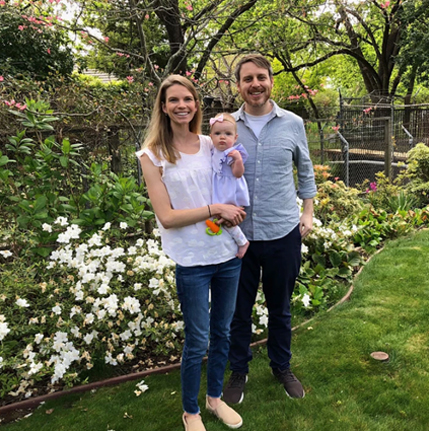
by Pirunrat Nathchayanonth (Yori), Client Coordinator | Jan 1, 2020 | Uncategorized
My college roommate (and bestie!) Barbara Jenkins is a Nursing Supervisor at hospital in San Francisco, California. I think of her often because I know she puts her life at risk everyday when she goes into work. We finally got a chance to catch up and I realized that everyone would benefit from the information she shared because many may be wondering the same things I was about her and all the other heroes on the front lines. Before we get into discussion about the situation, I’ll have her introduce herself:
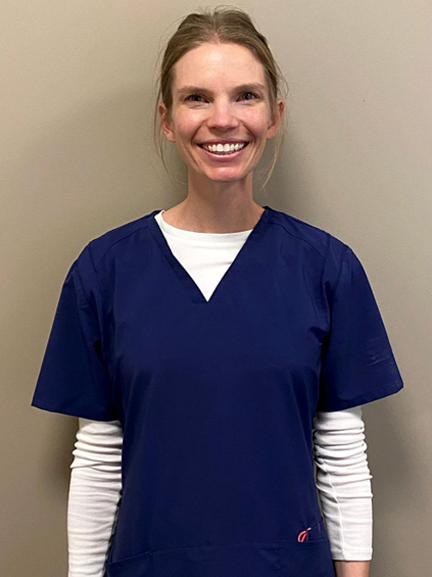
Tell us a bit about yourself.
Hi my name is Barbara and I am a nurse at a busy hospital! My family and I currently live in San Francisco and have been sheltering in place (SIP) for 7 weeks now. My husband works in tech and has been working from home since early March and we have a 7 month old daughter, Nora. Nora is not quite sure what is happening but enjoys spending extra time with her parents but is a little skeptical of us when we wear masks.
How did you get into nursing?
In college I worked in a medical research lab and enjoyed the work but wanted a more personal interaction. I started volunteering at the hospital and instantly knew that I wanted to become a nurse. I love caring for other people and being able to support them through difficult times. After finishing nursing school, I was able to work in many different hospitals in the US.
What is your day at work like now since COVID19 started?
It is very different. The emergency room has slowed down (maybe because of the fear of coming to the hospital), we have cancelled all elective surgeries and we have limited visitors. The halls seem eerily quiet. Right now, we have only a few COVID positive patients admitted a week. Because we have “flattened the curve” we have the time and resources to provide excellent care to our patients.

How do you feel about having to go to work on the front lines and coming home to a baby and husband?
It is a little bit stressful, but as nurses we take care of patients with many contagious diseases and I don’t want to bring any of them home to my family. I follow precautions at work, shower and change when I get home and monitor my temperature several times a day.
You have parents and grandparents that are over 60. What would you tell them to do now to stay safe?
I tell my grandparents to stay home but stay mentally and physically active. They like to sit on their front porch and wave at neighbors walking by. I have asked them to reach out to friends to help them with errands. They have figured out how to Zoom and look forward to seeing Nora during our Saturday morning “meetings”.
What would you advise to those that are immunocompromised?
Stay home if possible. Make sure the people you live with are also sheltering in place, washing hands, and following precautions. Be in close contact with your doctor.
Do people need to be scared to go to the doctor?
Don’t be scared to go to the doctor, if needed. There have always been sick people in the doctors’ office (patients with the flu, RSV, etc). If it could be done virtually that is great, but some issues need to be addressed in person. We went to the pediatrician in early March for Nora’s 6 month appointment. They removed the toys from the waiting area (I have always been nervous about the germs on those) and really separated well babies from sick babies). The staff took precautions to keep themselves and us safe.
Do you think that only essential staff and emergency cases should be going to a hospital nowadays?
If you need urgent medical care, come to the hospital. Please don’t delay care that you need because of COVID. We don’t want patients to get sicker at home because they are scared to come to the emergency room.
What does it mean to be asymptomatic and why is this so dangerous?
Asymptomatic is when people develop no symptoms but are active carriers of the virus. Some people are presymptomatic meaning that they currently have no symptoms but are infected and are incubating the virus. Then there are the mildly symptomatic people who may attribute their symptoms to other illnesses or allergies but the people they may infect can become very sick. All three of these categories of individuals are dangerous because they can unknowingly infect others with COIVD19.
What does it take for a COVID19 patient to get discharged from the hospital? Do they have to test negative?
Not all positive patients are in the hospital, many patients are self quarantining at home. If you do need medical assistance for a period of time, you do not need to be negative to be discharged. Some patients are able to return home but San Francisco also has hotels and nursing homes dedicated to housing COVID positive individuals.
How do you think life will change post-COVID?
Healthcare will change. There will be less people in the hospital and everything will move towards virtual care.
What are the drawbacks of healthcare moving towards virtual care?
It can be harder for some people to access if they are not set up with computers, cameras and online health accounts.
If there was one thing you could do if you were in charge to make the situation more manageable for front line workers, what would it be?
To be consistent. I feel like a lot of the initial panic was due to inconsistent messages and guidance. In the US, we do not have a national healthcare system and different healthcare systems are still responding differently. Companies are using different tests and have different protocols.
What’s the most heartwarming thing you’ve seen since covid19 began?
How our community has come together. Yesterday our neighbor turned 6 years old and his friends drove by his house in their decorated cars to celebrate with him.
Is there any advice you have for the general population?
Stay home, stay safe!
Thanks so much for your insight, Barb! I’m sure your information will help everyone that reads this in one way or another. Stay safe and thank you for being a true hero on the front lines.
Interview led by Devi Bajaj
Founder & Director of Enliven Health Concierge
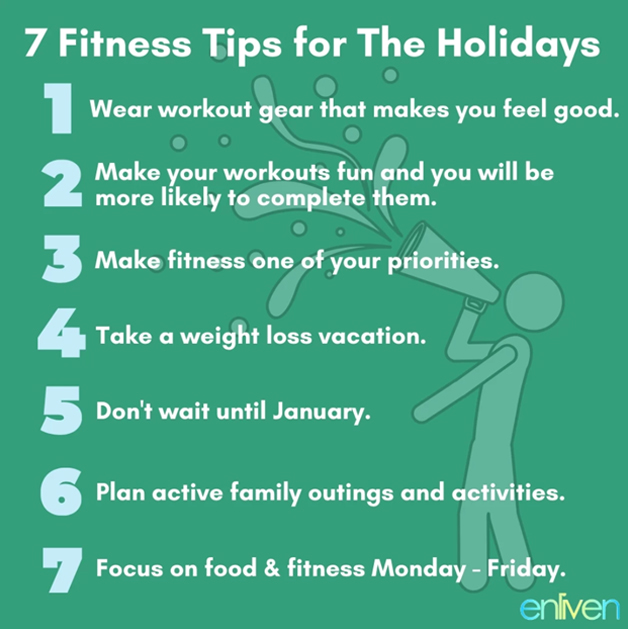
by Pirunrat Nathchayanonth (Yori), Client Coordinator | Dec 15, 2019 | Uncategorized
The holidays are here! This means lots of celebrations filled with delicious food and drink. We firmly believe in enjoying ourselves while keeping our health and wellness in check so we’ve created a series of tips for staying healthy during the holidays:
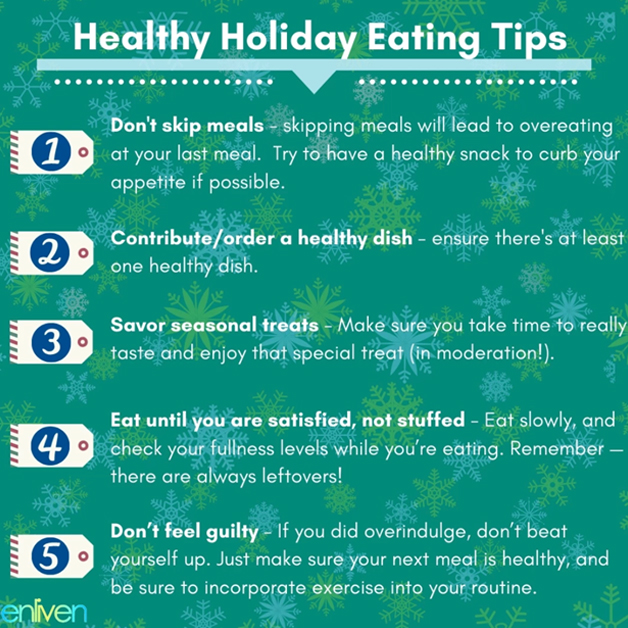
Our favorite tip from the ones listed above is the final one: don’t feel guilty! Enjoy yourself and don’t beat yourself up if you overdo it once in a while. Life is for living and having a good time! I also make it a point to continue intermittent fasting as much as I can throughout the holidays so my body has time to repair and rebuild itself. Have a look at our previous posts here and here to learn more about how intermittent fasting works.
Now let’s have a look at the tips for healthy holiday drinking:
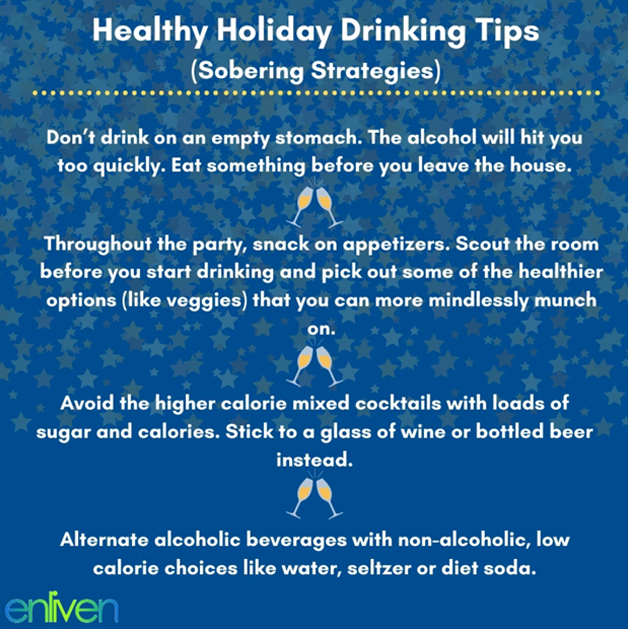
The key with drinking during the holidays is the same as eating – find a balance so you’re able to have a good time without going overboard or being frustrated by restricting yourself too much!
Now on to fitness tips:

Make sure you get in some exercise over the holidays – even if it’s just a walk at the park or a 15 minute stretch routine a day (Fitness Blender is an awesome resource and here is a link to one of their great stretch videos), your body and mind will thank you. Your body is the only place you have to live in, so give it the most love you possibly can and take care of it.
Have a look at more tips from some of our favorite Health & Wellness Portals and their thoughts on staying healthy during the holidays:
Enliven wishes everyone a very Happy and Healthy Holiday season!
Feel free to reach out if you want more tips on how to stay healthy during this time of year or throughout 2020, we’re here to help!
Written by Devi Bajaj
Founder and Director of Enliven Health Concierge
#EnlivenConcierge#MedicalConcierge#MedicalTourism#Health#Wellness#HealthyChoices#StayingHealthyDuringTheHolidays#HealthyEating#HealthyLiving#HealthyBodyHealthyMind

by Pirunrat Nathchayanonth (Yori), Client Coordinator | Nov 23, 2019 | Uncategorized
This week’s post is prompted by World Antibiotic Awareness Week (November 18-24, 2019)
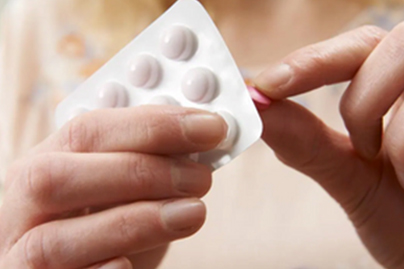
I’ve spent majority of my life in Bangkok. I was born at Samitivej Sukhumvit Hospital (now one of our trusted partners!) and lived in downtown Bangkok until I was 9 years old. For the next nine years I lived in Kobe, Japan, but came back to Bangkok every summer (for 2-3 months) and winter (for 2-3 weeks). Following that I spent five years in the United States where I studied Health Policy and Management at the University of Southern California and was experienced a variety of internships including stints at the Clinton Foundation in the Health Arm in Boston and the Asthma and Allergy Foundation of America (AAFA) in Washington DC.
It was during my time at AAFA that I learned about Antibiotic Resistance, but before getting into the details of resistance, let’s first understand what antibiotics are. As defined by the World Health Organization, antibiotics (or antibacterials) are medicines used to prevent and treat bacterial infections. Antibiotics CANNOT treat viral infections, such as cold, flu, and most coughs (https://www.medicalnewstoday.com/articles/10278.php). “Antibiotic resistance occurs when bacteria change in response to the use of these medicines. Bacteria, not humans or animals, become antibiotic-resistant. These bacteria may infect humans and animals, and the infections they cause are harder to treat than those caused by non-resistant bacteria. Antibiotic resistance leads to higher medical costs, prolonged hospital stays, and increased mortality. The world urgently needs to change the way it prescribes and uses antibiotics.” (https://www.who.int/news-room/fact-sheets/detail/antibiotic-resistance)
Have a look at this infographic from the WHO explaining how Antibiotic Resistance Spreads:

The reason I started this post mentioning that I’ve lived in Bangkok for most of my life is because during my childhood I went to so many doctors in this city when I have a cold or cough and the doctor almost automatically prescribes antibiotics. Before there was widespread knowledge about antibiotic resistance, this was the norm. Now that we know the threats it poses, before taking antibiotics for something that may not be bacterial in nature, please ask your doctor if you really need them. And if you know someone who frequently takes antibiotics for simple sneezes and sniffles, let them know they could be endangering themselves and their loved ones. (https://health.clevelandclinic.org/when-antibiotics-stop-working-whats-next/)
Have a look at this short but informative video about using antibiotics correctly and take action where needed:https://www.youtube.com/watch?v=-ZX97bIbZBQ(ask him to embed the video in the post pls)
Don’t get me wrong; antibiotics are not the devil. They are extremely effective to treat bronchitis, pneumonia, strep throat, ear infection, and pinkeye – as long as they’re caused by bacteria. If used correctly and only when required, there is nothing wrong with taking antibiotics.
Are you worried that you may take antibiotics too often? Or unsure if you take them when you don’t need to? Reach out to us and we will be happy to hear more about your concerns and find a way to help you.
Written by Devi Bajaj
Founder and Director of Enliven Health Concierge
#EnlivenConcierge#MedicalConcierge#MedicalTourism#Health#Antibiotics#Antibiotic#AntibioticResistance#AntibioticAwarenessWeek#Bacteria#BacterialInfection
by Pirunrat Nathchayanonth (Yori), Client Coordinator | Nov 9, 2019 | Uncategorized
I’m a person focused on having a routine and I believe this keeps me both physically and mentally healthy (and sane). I aim to intermittently fast for at least 16 hours a day for 5 days a week (to let the cells in my body rest, rebuild and repair), workout 3-5 to times a week, and sleep at least 6 hours a night.
My husband is in an entirely different field of work. His event management job requires him to be on his feet for 12-16 hours at a time, sleep late and eat only when (or if) he gets a break. As a result he was often fatigued and would come home from work sneezing or with the sniffles.
I was determined to find a way to make him feel better, without it being complicated or taking too much of his time because I knew if I told him it would take longer than an hour every couple weeks that he (and I) wouldn’t succeed in the long term. After reading up on my favorite online portals for healthy living (I’ve listed a few of them at the bottom of this post for your reference) and discussing with colleagues in the field of health and wellness, I decided what he should try to do to make him feel better. There was a consensus across the board that he needs to replenish the nutrients and vitamins in his body, so I suggested direct insertion of these essentials into his blood stream intravenously.
The most popular IV for rejuvenation across the world is called the “Myers’ Cocktail” developed by Dr. John Myers of John Hopkins Medical School. It is compromised of the following components:
He was nervous at first, but after speaking to the doctor who explained the benefits of the IV (but making it a point that this is not a long term solution, however ensured that it can help in the interim while he moves towards a healthier lifestyle), he said he’ll give it a shot. On the day of the first drip he had a slight fever and was feeling very tired which resulted in a good night’s sleep and more energy the next day and coming weeks. IV drips work by increasing the blood concentration of several essential vitamins and minerals beyond that which can be achieved when supplementing orally. For example, Vitamin C given intravenously has been found to reach blood concentrations more than 50 times greater than what can be achieved when given orally. (https://theremedyroom.com/2014/01/what-is-a-meyers-cocktail/), therefore definitely helping immunity if needed.
With the doctor’s recommendation we also started him on melatonin supplements for when he flies (he has major anxiety and this helps to calm him down), and to ease his mind and put him to sleep easier for the nights when his mind is racing. He used to have terrible acid reflux problems and applying intermittent fasting to his lifestyle has essentially cured that. Furthermore, a family member suggested that he start taking metamucil (https://www.metamucil.com/en-us/articles/Fiber-101/metamucil-faqs) which is a plant-based fiber supplement to aid digestive health (we’ll get more into gut health in an upcoming post, so stay tuned).
It’s been a couple months now and he generally seems to feel better from his lifestyle adjustments, and the occasional Myers’ cocktail. The main result is that it’s helped his immunity (he now rarely comes home with a cold) and makes him feel hydrated. It’s important to note that IV drips are not a substitute for healthy habits in your daily life—these should not be seen as quick fixes (https://www.wellandgood.com/good-advice/iv-drip-therapy-health-risks/).
Before getting into the habit of adding IV drips to your routine, ask yourself if you can obtain the vitamins, minerals and nutrients by having a well-balanced diet that meets your needs. If after trying that you don’t see any improvement, it may be time to check if your vitamin and micronutrient levels require supplementation. We have a team of specialists who can support if you reach to that point, or even if you’d like to ask some questions about your health and chat further so do feel free to reach out.
Written by Devi Bajaj
Founder and Director of Enliven Health Concierge
Some of our favorite Health & Wellness Portals and their thoughts on IV therapy:
#EnlivenConcierge#MedicalConcierge#IVDrips#MyersCocktail#Fatigue#IntermittentFasting#Melatonin#HealthyLiving#HealthyChoices#Bangkok#Thailand
by Pirunrat Nathchayanonth (Yori), Client Coordinator | Oct 21, 2019 | Uncategorized
As a previous employee of the first hospital in Asia to receive JCI accreditation (the international stamp of approval for medical facilities) which is also a pioneer of medical tourism in Thailand, I’ve seen a variety of extremely happy patients and excruciatingly dissatisfied patients from all over the world.
There have been countless times where people have come up to me and said something on the lines of: “[insert hospital name here] is so expensive and it’s really not worth it.” Before defending my workplace of almost 10 years, I always ask them to tell me every detail that made them feel this way. What was the doctor’s name? What was the core problem? Once I have this data I give them my suggestions for a solution.
About half the time it’s an issue of a physician trying to “force” medicine or a surgical procedure on a patient. This is when I tell the patient that didn’t want to pay for medicine at the hospital cashier that they have the absolute right to request for the physician to write the list of
recommended medication so it can be taken to an outside pharmacy. Here at Enliven Concierge we work with a wide range of pharmacies with reasonable pricing, so you can bring that list to us and we will be more than happy to fulfill the order! Please note though, that there are certain medications which require a physicians prescription, so keep that in mind if an item on your list falls into that category.
For the second complaint, my response entirely depends on who the physician is. I know a fair number of doctors that push surgery because they have revenue targets to meet or the more surgeries they do in a day the more money they make (ahem, ob/gynos who push for c-section without even considering natural birth), but there are others that will only say a person needs surgery when it is absolutely necessary.
If I hear the doctor’s name and based on my knowledge it is one that would definitely recommend surgery regardless of the circumstance, I would suggest a second opinion with a doctor that may find another solution. If the patient is willing, I request for them to let us share the recommendations/medical labs/reports/X-Ray/MRI with someone on the Enliven Concierge medical team (at no cost whatsoever!) for another opinion. There are medical professionals who are not inclined to go with surgery and genuinely aim to treat with every other possible option before saying it’s time to go into the OR. It is when these doctors say surgery is imperative do we believe it really is.
When surgery is unavoidable comes the decision of which surgeon and medical facility to proceed with. In my opinion, some of the nation’s best doctors practice at Siriraj or Chula (public medical facilities affiliated with universities) for majority of the time and split their time
with private hospitals. Now, to have your surgery led by one of these physicians either you opt to wait for what could be a very long period of time at a public facility, or Enliven Concierge can arrange with our partners for the physician to come to one of the private facilities that we work
with to get you what you need right away. Sometimes paying for the best does pay off, especially when the patient’s results and happiness from the experience makes it all worth it.
It is the multitude of issues of this type that people came to me with regularly which prompted me to set up Enliven Concierge. Based on our team’s experience, we have created an opportunity to provide solutions and assistance to patients and hospitals (and holistic wellness centers, physiotherapy centers, Ayurvedic centers, and all our other health and wellness partners) alike. Come to us and we guarantee that we will take exceptional care of you.
Written by Devi Bajaj
Founder and Director of Enliven Health Concierge
Page 6 of 6« First«...23456








